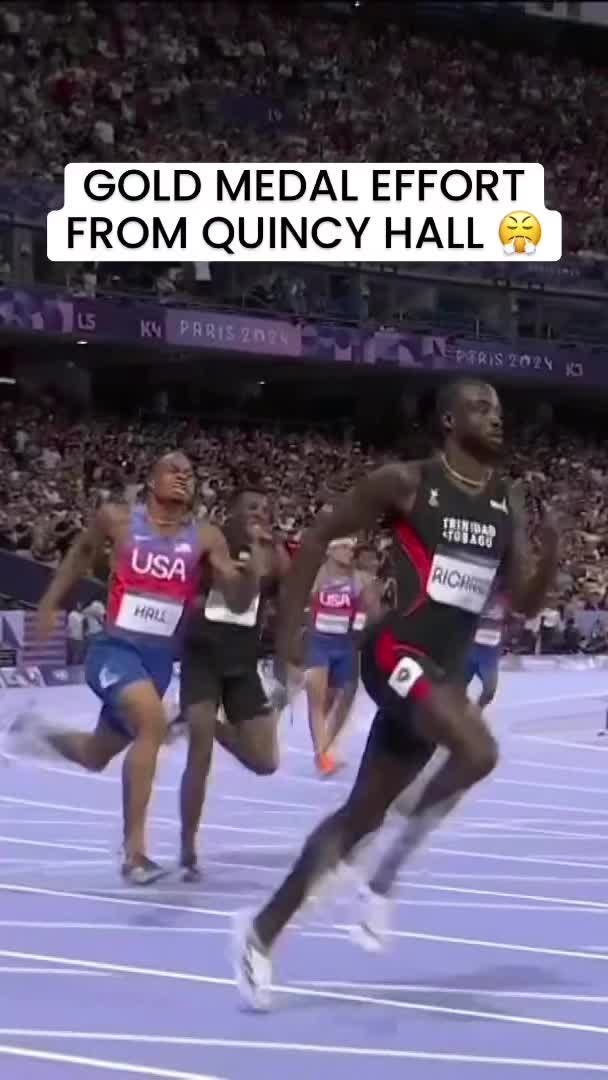Rings Roundup, Day 12: THE GREATEST HANDBALL FINISH YOU WILL EVER SEE
Plus, Team USA keeps coming back and winning the most exciting races at the Olympics.
There’s a moment in every Olympics where it looks like Team USA might lose the overall gold medal count. In 2020, they trailed China 32-24 after Day 11 of the games; this year, they were down 13-9 after Day 7.
But the Olympics tend to be backloaded for the Americans, with the start of track and wrestling—and the end of tournaments in team sports like basketball, volleyball, and water polo. Team USA won three golds on Wednesday to take a two-gold lead on China. But they’re also winning in events you wouldn’t expect—like the women’s team pursuit, where Alaskan Harvard rower Kristen Faulkner won her second gold in cycling:
Let’s give out some Olympic rings. (Now with art!)
400 Rings: Another golden track comeback
It’s not just that Team USA has won a medal in every men’s track event so far, from the 100-meter dash to the 10k. It’s the way they’ve won those medals. American runners have three golds in Paris—and in all three of them, they’ve come from out of nowhere. Noah Lyles was in last place halfway through the 100m, Cole Hocker was behind the two gold medal favorites heading into the final turn, and Wednesday, Quincy Hall was in fifth place 300 meters into the 400m. Gold, gold, gold.
It’s tough to pick a favorite, but Hall’s may have been the most impossible to believe. He wasn’t just in fifth place: He looked exhausted.
His opponents had paced themselves, but he got to 300 meters and started fighting the ground with every step. His face was locked in the pure image of agony, with clenched jaws and gritted teeth. His torso teetered out over his body like his legs couldn’t keep up with his momentum. His legs were pounding the ground and his fists were pounding the air. Every indicator on his dashboard was flashing red, from the check engine light to the tire pressure, and of course, he was out of gas.
And yet, he started gaining on his opponents. He blew past them, one by one, their efficient strides unable to keep up with his Waluigi-ass running form. All four of the top finishers ran personal bests and set national records. But none were as good as the guy who ran like he’d never run before. (Literally: He was running like someone who had never tried running before and maybe didn’t know how long the race was.)
Throw in the wins by Lyles and Hocker, the late kick by Team USA’s Grant Fisher to win bronze in the 10k and yesterday, a late kick by Kenneth Rooks to win silver in the steeplechase, and it starts to feel like a team-wide mantra. American runners may not get great jumps, and may not even look like they’re competitive at all down the stretch of their races. But they’re gonna fight to the finish.
7 Rings: Handball OT
I tried to tell you to watch handball. I wrote about handball. I tweeted about handball. I engaged in a letter-writing campaign to tell voters in swing states about handball. I went to the roof of my building with a megaphone and yelled about handball. I committed various crimes and wrote cryptic messages to the police with a complex cypher that read “you should watch handball.” I rented out a skywriting plane to write HANDBALL above major cities.
AND I HOPE PEOPLE LISTENED.
BECAUSE.
THE WILDEST THING IN THE ENTIRE OLYMPIC GAMES HAPPENED IN THE MEN’S HANDBALL QUARTERFINALS!!!!!!!!!
France was a gold medal favorite in handball. After all, French teams have been crushing in basically every event—they had a podium sweep in BMX racing and won a damn bronze medal in table tennis! And in handball, they’d won three of the last four gold medals and their star, Nikola Karabatic is considered one of the greatest players of all time.
And against Germany, they led by two goals with 15 seconds to go. This should have been, essentially, an automatic win. There’s no shot clock in handball—a team can be penalized for passive play, but they’ll first receive a warning from the ref, and after that warning they’ll be allowed four passes—so they could have simply run the clock out, even after Germany scored a goal to cut the deficit to one. The German defense was not even really trying to create a turnover—they backed off, allowing France to end the game uncontested.
And then, with five seconds left, France called timeout.
They did not need to call timeout! They could have just won the game! But instead they stopped the clock and allowed Germany to reconsider their “giving up” strategy. But still, they’d need to force a turnover, get the ball upcourt, shoot and score, with the ball entirely crossing the line before the clock hit zero.
GUESS WHAT HAPPENED.
Germany’s goal sent the game to overtime. In OT, France scored a game-tying goal with 15 seconds left, then Germany scored a go-ahead goal with five seconds left, then France got the ball down the court and took a potential shot to send the game to double OT… but it was saved by the French keeper. Game over. Olympics over.
Not every handball game is like this. Most games do not involve an Olympic champion turning a guaranteed win into a loss with Mario Cristobal-esque decision-making in front of tens of thousands of thrilled-then-devastated fans. But if that moment can’t convince you to watch handball, I don’t think anything will.
5 Rings: A Head-to-head victory
I’d be curious to research the Darwin’s finch-esque differences between goalies in various sports. What makes someone an exceptional lacrosse goalkeeper as opposed to hockey, field or ice? Why does an Irish lad go into Gaelic football goalkeeping as opposed to soccer goalkeeping? Obviously, they share commonalities, like reflexes and a compulsive need to endure hardships rather than experiencing joy—but what are the things which make each sport’s netminders so unique?
In water polo, the differentiating factors are somewhat obvious: swimming ability, upper body strength, and most importantly, a willingness to use their head to deflect shots. In other sports, the goalkeeper’s head is at best an accidental deflector; in water polo, the head is the main blocker for the center of the shooting target.
On Wednesday, Team USA played Australia in the quarters of the men’s water polo tournament, battling back from a 5-2 deficit (massive in water polo) to tie the game in the final minute. Instead of playing more water polo—32 minutes of swim-fight-drowning is hard enough—they go straight to a penalty shootout.
And that’s when Team USA’s Adriian Weinberg got his head in the game, rising out of the water to win a face off with one of Australia’s shooters.
https://www.tiktok.com/@nbcolympics/photo/7400607861434289450?lang=en
The Americans won the shootout 4-3, putting Team USA in the semis against Serbia, a team which had a losing record in pool play. While the women have won back-to-back-to-back gold medals, the men’s team hasn’t reached the semis or medaled since 2008.
3 Rings: WE’RE A FANCY SWIMMING COUNTRY!
Team USA got a silver in artistic swimming, our first in 20 years. The American entered the final day of competition in second place after the free and technical swims, but for the first time, teams would also have to complete an “acrobatic” swim, where swimmers throw each other out of the water in an artistic, fancy way.
And guess what: We’re good at chucking our fancy swimming friends here in America.
Team USA didn’t have a chance of catching China for gold, but finished second in the acrobatic event to take the silver.
2 Rings: Another win (kinda) for big Ryan
The gold medal in discus went to Jamaica’s Rojé Stona, the island’s first-ever medal in a throwing event. Entering these Olympics, Jamaica had 84 Olympic medals in track events including 26 golds, a silver and a bronze in the long jump, and a bronze in cycling. But in Paris, they’ve won four medals in field events—Stona’s discus gold, silve by Shaneika Ricketts in the triple jump and Wayne Pinnock in the long jump, and Rajindra Campbell in the shot put. They’re a field country now!
Stona wasn’t expected to win after Mykolas Alekna broke the sport’s 40-year old world record in Oklahoma in April. As recently as May, Stona seemed to think his future was in the NFL rather than throwing. Alekna seemed the sure winner after breaking his father’s Olympic record with a 69.97-meter throw… but then Stona barely eclipsed the Lithuanian with a 70.00 meter throw. It’s just about the closest throwing event you’ll ever see at the Olympics.
Stona was a good-but-not-great thrower at Clemson, finishing second at the ACC championships and runner-up at Jamaican nationals in 2022. Then he transferred to Arkansas, and began working with a somewhat famous volunteer assistant coach for the Razorbacks: Ryan Crouser, the greatest shot putter of all time. Crouser was in the crowd as Stona’s biggest fan. (Literally, most likely!)
In addition to being a 6-foot-7, 330-pound monster, Crouser prides himself on scheming up body mechanics and inventing better ways to throw big things, and says he wants to switch to (or at least add) throwing the discus after the Paris Olympics. He doesn’t get a gold medal for coaching, but damn, that guy knows how to throw stuff.
1 Ring: A Volleyball choke
We celebrated Americans coming back, so we must celebrate Americans blowing.a lead. The American men’s volleyball team was matched up in the semis against Poland, the team that beat them in the 2023 Nations League championship game. They went up 2 sets to 1 and had a 4-point lead in the fourth set, but lost in a five-setter that left all participants emotionally drained. This is how Poland looked after winning.
I would like to revisit the entire set-based system of volleyball scoring. Team USA outscored Poland 111-104 over the course of the match, but took the L because those points were poorly distributed through the five sets. What sort of electoral college BS is this? The good news is Team USA can still win the bronze medal over
0 Rings: A devastating weigh-in
Team USA won another gold in women’s wrestling Wednesday, as Sarah Hildebrandt dominated Cuban wrestler Yusneylys Guzman to win gold in the 50 kg category. But Hildebrandt was supposed to face India’s Vinesh Phogat, who went on a dream run through the bracket with hopes of winning the first gold medal of the Paris games for the world’s most populous country. But Phogat weighed in at 50.1 kilograms and was disqualified—a devastating result for an admirable sports hero.
Phogat became a national news-maker after leading a successful protest against sexual harassment by the president of the Indian wrestling federation, a powerful politician named Brij Bhushan Sharan Singh. Phogat had won Commonwealth Games gold medals, but was dragged, battered, and arrested by police during her protest. The images of the wrestling star being abused by police went viral, the wrestling federation was overhauled. She’d won a moral victory, and in Paris she started racking up wrestling victories, too: In the first round, she stunned Japans’s Yui Sasaki, the 2020 gold medalist and 4-time world champion, who had never lost in international competition before. And she had a 2-0 career record against Hildebrandt, meaning she would’ve been favored to win gold if she’d gotten to fight.
Phogat made weight on Day 1, but after eating and rehydrating, her weight went back up to 52.7kg. She tried everything to get back down to the unnaturally low weight: According to India’s Sportstar magazine , she didn’t eat or sleep Tuesday night, spent three hours in a sauna, cut her hair, and tried to force herself to vomit. But she couldn’t get below 50.1. She collapsed from exhaustion and dehydration and needed to be hospitalized.
Phogat won the bronze medal at the 2022 World Championships at 53 kg, and petitioned the reformed Indian federation to send her in that category. Instead, they asked her to drop down to drop down to 50 kg, sending a wrestler who lost her first-round bout badly in the 53 kg category. Phogat could have potentially won gold in her natural category but instead got DQ’ed and hospitalized because of the poor decisions of those in power.



















The goalie conversation is an interesting thing I talk about all the time as a former lacrosse goalie.
Lacrosse, I believe, is the hardest skill set for being a goalie - and I know that sounds biased, but hear me out. Ice hockey is around 92%, and lacrosse - at least men's - is around 50%. These are both high volume shot games, but the difference is two parts: one is size, and two is plane. Firstly, Hockey goalies take up a large portion of the net severaley padded, most saves coming as stops or ricochets off of a stick or pad. The hockey goal is also much shorter, allowing the goalie to not need to take up taller portions of the net. Lacrosse has a 6’x6’ net where the goalie clearly does not fill up that entire space well and constantly has to readjust their position to put themself in front of the most statistically likely shot, which brings me to plane.
Hockey always begins from the ground/ice, so there are three shot options: low-low, low-mid, or low-high. And, again, the dimensions of the hockey net are a lot shorter than most, so the “high” and “mid” options are covered in less space. Because of the manipulation of the ball with the stick and in men’s the depth of the pocket, we get a potential wild combination of shot prospects, with nine different combinations (3 low beginnings, 3 mid beginnings, 3 high beginnings), none of which, ever look the same and can end up anywhere. Then, when you factor in bounce shots which can also end up all over the place, it truly becomes bizarre.
The average soccer goalie save percentage is around 69 (nice)-70% and field hockey is ~80%. But again, these shots always start from the ground. And yes, there are of course bad bounces and headers and what not, but those are outliers. You also have to factor in water polo, which is around the same percentage as lacrosse, and I physically cannot grasp how they do what they do. However, the thing with these three sports, unlike hockey and lacrosse, are the wildly low amount of shots taken per game. Yes, water polo has some of the same manipulation by hand the lacrosse does, but it at least starts at water surface level always.
This leaves team handball, with the absurdly low rate of 35%. Very similarly to lacrosse, there is insane shot probability and manipulation to be done by the shooter. Now, it is ridiculous to expect people to save balls the size of mini soccer balls in front of a goal that is almost the size of a soccer net. Obviously they take on a tremendous amount of shots per game and that is before considering any penalty shots. But this, I feel, is a deciding factor: distance. In lacrosse, there is approximately a 3’ radius from the center of the net. Any offensive player can creep up on the goalie for a one on one and deke them out in atrocious fashion (I have been on the end of this one too many times). In handball, the goalie’s zone is 6 meters - nearly 20 ft away - from the goal line. And yes, with jumping that length gets shortened, but that distance is a complete advantage as compared to having someone right on top of you scoring.
That is all to say I stand by lacrosse goalie’s having the hardest job of any goalie in all of sports and the way we fix American handball is by recruiting former lacrosse goalies - who are used to being thinly padded against 100mph dense rubber shots with great reaction time and vision to lead us to the promised land. Thanks for coming to my TED Talk.
It's been confirmed that Hall "strained his leg" in the race WHERE HE CAME FROM BEHIND to win gold. You can't outrun a dog.
https://x.com/ChrisChavez/status/1821607139170824557